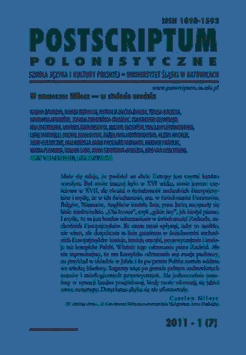Tropem myśliwego. Echa Mickiewiczowskie w poezji Czesława Miłosza (i nie tylko)
On the Hunter's Trail. Mickiewiczian Echoes in the Poetry of Czesław Miłosz (and Beyond)
Author(s): Kris Van HeuckelomSubject(s): Language and Literature Studies
Published by: Wydawnictwo Uniwersytetu Śląskiego
Keywords: Czesław Miłosz; Adam Mickiewicz; “literary echoes”; intertextuality; mythologization
Summary/Abstract: It is a truism that the work of Adam Mickiewicz occupies a central place in Czesław Miłosz‟s literary universe. The present paper seeks to investigate one particular Mickiewiczian micro-element that strikingly often recurs in Miłosz‟s writings, namely the so-called “kernel” of the Lithuanian forests (jądro gęstwiny). Significantly, while wilderness areas such as woods and forests have always filled the human imagination with awe and fear, Miłosz has turned the Lithuanian “thicket” into one of the cornerstones of his poetic topography, investing its mysterious “kernel” with epiphanic and eschatological potential. Partially mediated by some of his other childhood readings Lato leśnych ludzi (The Forest People’s Summer) by Zofia Rodziewiczówna, Na tropie przyrody (On the Trail of Nature) and W puszczy (In the Wood) by Włodzimierz Korsak, Nasz las i jego mieszkańcy (Our Forest and Its Inhabitants) by Bohdan Dyakowski and Soból i panna (The Sable and the Girl) by Józef Weyssenhoff), Miłosz‟s mythologization (if not sacralization) of the wildland spaces of his childhood might be said to add a particular (pagan and gendered) twist to the traditional repertory of Christian (u)topography, in particular its rural and urban manifestations (the Garden of Eden and Heavenly Jerusalem).
Journal: Postscriptum Polonistyczne
- Issue Year: 7/2011
- Issue No: 1
- Page Range: 213-232
- Page Count: 20
- Language: Polish

